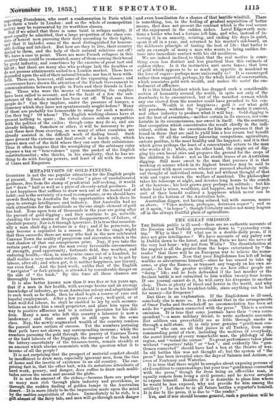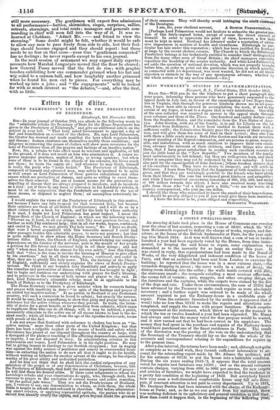THE GREAT OMISSION.
THE British public is ill-used—there are no authentic accounts of the Russian and Turkish proceedings down to "yesterday even- ing." Why is that ? Of what use is a double-daily press, if it does not give intelligence ? We have accounts of any paltry row in Dublin down to the latest, and from Paris we have the news of the very last hour : why not from Widin ? The dissatisfaction at the neglect is all the greater from the hopes entertained by "the reader" that there will be an European war to relieve the mono- tony of the papers. Now that your Englishman has left off being warlike or adventurous himself,—since he has ceased to take up arms, or play the Romeo, or transact any tragedy on his own an- count,—he has the greater avidity to see how other people are " doing " life; and he feels defrauded if the last murder or the freshest battle is not submitted to him within twenty-four hours. If one journal cannot do it, he will carry his fivepence to another shop. There is plenty of blood and horror in the world, and why should it not be on his breakfast-table, since anything can be had for money—for fivepenoe ? But there is an explanation. If the Englishman is ill-used, somebody else is more so. It is evident that in the arrangements of Omer Pacha and Gortschakoff no accommodation has been set aside for "gentlemen connected with the press." This is a serious I omission. It is true that some journals have their "own corre- spondent "—a mere military friend, to write authentic accounts. But soldiers can proverbially see as little through smoke as through a mill-stone. It is only your genuine "gentleman con- nected" who can Bee all that passes in all Turkey, from some commanding point of view, including the motives of everybody, the secret history of every remarkable man, the philology of the region, and "round the corner." No great performance takes place without "reporters' table" or " box "; and evidently the "gen- tlemen connected" should have had a box at the theatre of war. In old battles this was not thought of; but the system of "the press" has been invented since the days of Salamis and Actium, or even of Fontenoy and Waterloo. It is true that there might be scruples about exposing persons of civil condition to cannonadings ; but your true "gentleman connected with the press," though far from being an offleerlike man, is equally remote from beings civil person; and he never scruples to 'expose himself. Besides, if it is desirable to place him where he would be less exposed, why not provide for him among the artillery? Let there be in all future battles a -repcater's tumbriL It is due to the press, it is due to "the reader." Yogi, audit war should become general, such a proyhical wUl be still more necessary. The gentlemen will expect free admissions to all performanoes—battles, skirmishes, sieges, surprises, sallies, retreats, stormings, and total routs ; managers and generals com- manding in chief will soon fall into the way of it. It was re- hearsed at Chobham. "Admit Mr. — and friend to view the storming." Some doubt might be felt, whether it would be safe to allow any men to pass freely from side to side, lest their feel- ings should become engaged and they should report : but there needs be no fear on that score—your true "gentleman connected" has no feelings ; he never reports except to his own journal. In the next session of armament we may expect daily reports ; accounts how Marshal Longuepee moved that the floor be cleared ; how General Fusee moved that the fort do rise; with graphic touches exhibiting how one commander grinned when his hat and wig ceded to a cannon-ball, and how laughably another grimaced when he found his men cut to pieces. For everything may be worked up into a joke ; and "the engagements" will be looked for with as much interest as "the debates,"—and, after the first, with as little.



































 Previous page
Previous page